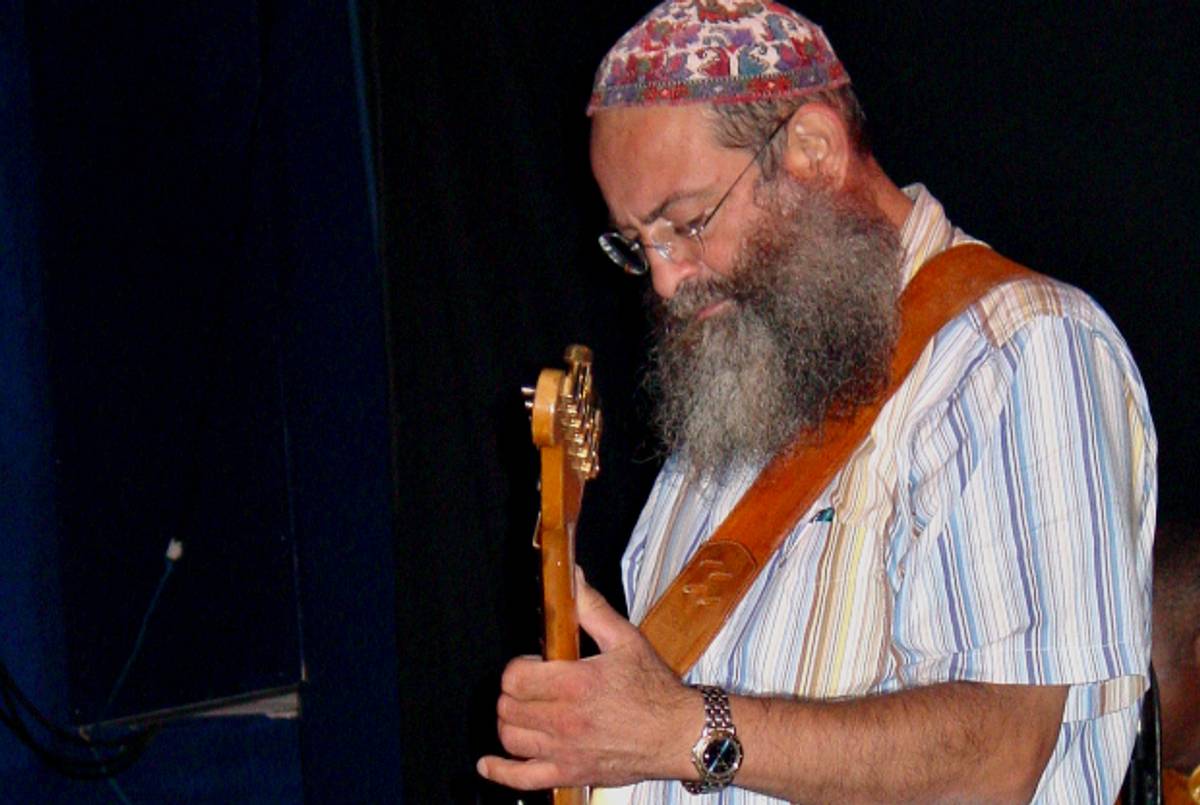
Yosi Piamenta, a self-dubbed “Jewish rock-and-roller,” is under a medically induced coma, according to frequent collaborator Naftali Kalfa. Born in Israel in 1951, Piamenta, who first played area weddings and bar mitzvahs while a resident of Brooklyn prior to putting his stamp onto the New York City scene, has rocked international audiences for decades with genre-blending licks from his Stratocaster and Hebrew vocals, often with his brother, Avi. Piamenta, who was reportedly ill last year, has six children.
“Mentioning the late guitarist and leader of the Grateful Dead appears to be unavoidable at Mr. Piamenta’s concerts,” reported The New York Times in 1998. “With his full beard, tie-dyed shirt (adorned, of course, with religious fringes) and a psychedelically embroidered skullcap, the ”Sephardic Santana,” as he is sometimes called, makes no apologies for embracing the trappings of the counterculture.
In 1994, music writer Richard Gehr wrote a piece for The Village Voice, in which he describes his unabashed awe of Piamenta:
It took me months to figure out what Yosi Piamenta’s right hand was doing when he played his guitar. With an unfiltered Players usually clasped between its fourth and fifth digits, the “Hasidic Hendrix”‘s paw seemed to strum the strings like a rhythm guitarist, yet wildly spiraling Arabic melodies spun up and away out of all visual relationship–screwed-tight Oriental outbursts punctuated by distant echoes of the electric-guitar pantheon, from Clapton to Zappa to Mahavishnu John. What was going on? Suddenly last week it became clear: Piamenta was picking leads on his battered old Fender as though it were an electric oud. Bubbling underneath his screaming, fleet-fingered solos lay a few thousand years of Arabic technique picked up as a fourteenth-generation Sephardic Jerusalemer.
Later in the essay, Gehr juxtaposes the not-so-dissimilar scene of a Hasidic wedding with a jam-packed Lower East Side show, both of which Piamenta played:
Not that you can exactly grok the Hasidic wedding scene without experiencing one. Attending to their festivities with a transcendent communal fervor shared by ravers, Sufis, punks, and voodoo practitioners. The Lubavitch men-folk in particular tend to party on the cusp of the millenium, slamming bodies against one another with intimate violence and throwing fists in the air in some timeless mosh pit of the spirit. Onstage, Yosi stands in portly, bearded, Garcia-esque repose, calmy driving his audience into a freylekh frenzy as children wander underfoot, rabbis kibitz, and the occasional guest vocalizes a favorite tune amid the circle dances, clattering crockery, and general abandon. (On the other side of the room, separated by a white wicker fence, daughters and wives have just as much fun working up line dances.) Having attended such events recently, I was struck by an admission of Craig Horowitz, who set the stage for his account of Lubavitch spiritual politics in last week’s New York by observing, “They danced and celebrated with such unbridled joy and raw emotion that I felt embarrassed to be watching.”
If Yosi had been transcending time and genre onstage, Horowitz might have been more inclined to plunge into the intensity. Last Monday night, Pimienta played at his keyboardist’s Lubavitch wedding. On Tuesday, the Knitting Factory was packed with young Hasids thrilled to catch him in a more informal setting. In addition to Yosi’s flutist brother, Avi (a zealous Jerusalem Lubavitcher who concluded the show with a brief commercial for the Moshiach), this latest version of the Piamenta band integrates the recently formed, unorthodoxly orthodox Hasidic New Wave ensemble, consisting of Israeli drummer Shlomo Deshet and bassist Bentzi Gafni of the local fusion band Esta, Frank London, and saxophonist Gregory Wall.
Here are links to some of his music for your enjoyment:
‘Asher Bara’ (to the tune of Men at Work’s ‘Land Down Under’)
‘Geni’ (live at B.B. King’s, with Heavenly Jams Band)
Jammin’, soloing to Jimi Hendrix’s ‘Hey Joe’
Jonathan Zalman is a writer and teacher based in Brooklyn.